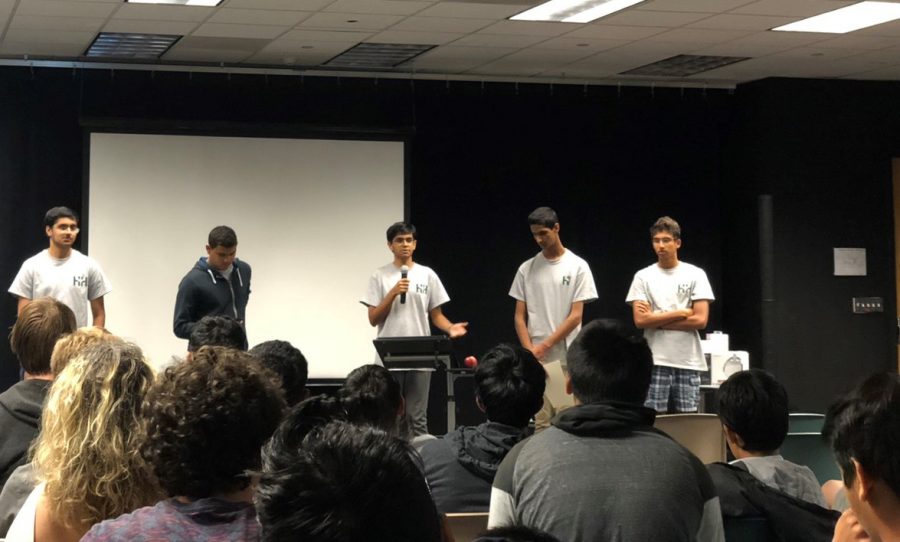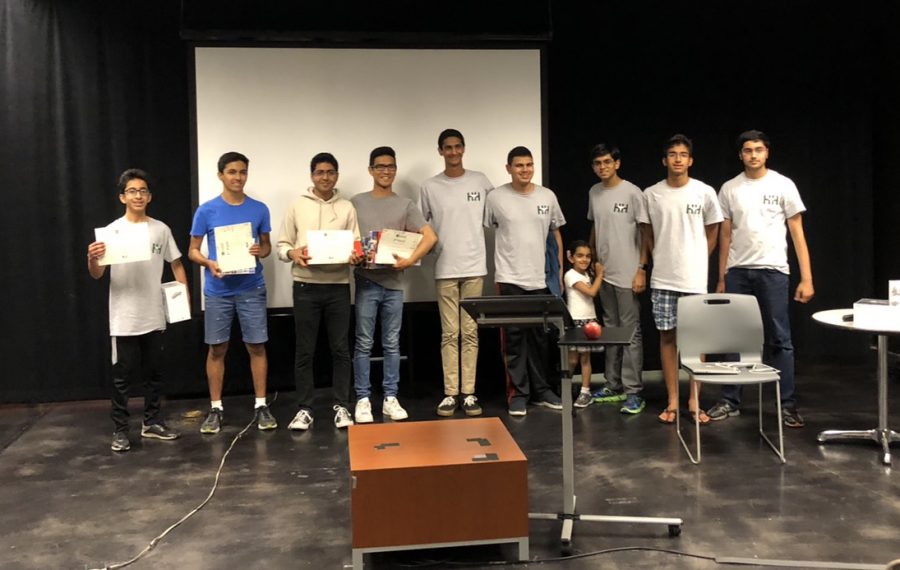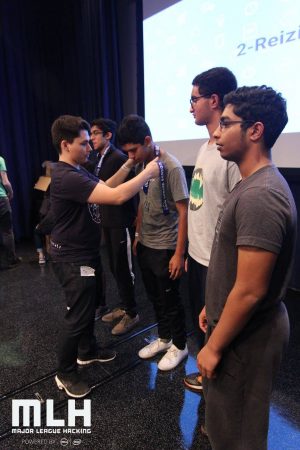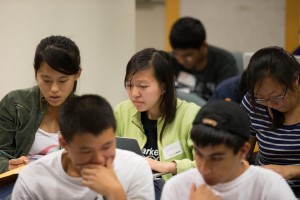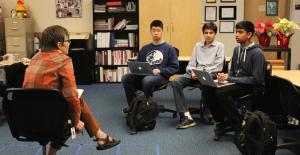Upcoming Bay Area hackathon organized by veteran Harker coder
Provided by Nakul Bajaj.
Nakul Bajaj (11) speaks during HarkerHacks with fellow officers Rohan Sonecha (11), Arnav Joshi (11), Arjun Akkiraju (11), and Arun Sundaresan (11). HarkerHacks 2018 took place from June 9 – 10 at 42 Silicon Valley.
October 18, 2018
For the past three years, the renowned HSHacks hackathon has invited coding neophytes and wizards alike from the Bay Area and beyond for a chance to test their skills through a day and a half of coding. This year, the hackathon continues in its fourth annual event this coming weekend in Palo Alto thanks to the help of junior Nakul Bajaj and his friends.
Nakul is now the lead organizer of this year’s HSHacks event, which was the first major high school hackathon run by Bay Area students. The event will take place from Oct. 20-21 at the Amazon Web Services office in Palo Alto. Attendees of all skill levels will be able to immerse themselves in code for 24 hours as they learn from mentors, attend workshops and compete against other participants for awards with the products they code up during the event.
“The importance of hackathons falls in line with the idea that we should be looking to create different products that are useable. We shouldn’t just be looking to achieve some goal in the academic environment,” Nakul said. “Hackathons are very focused on what can people use, rather than worrying about solving some obscure question that does not apply to real-life users.”
But Nakul didn’t start off leading prominent hackathons around the Bay Area: his coding journey started a decade ago. When he was just six years old, Nakul’s father brought home the original iPhone. Nakul’s curiosity and interest in the design and technology behind the device motivated him to research and find innovative ways to make his mark in the the digital world.
In middle school, Nakul saw success with his first app, a simple game where the user was provided with a random number and asked to shift a small bar to predict where on a line from 1 to 100 this number would be.
In subsequent years, as he took more online courses and developed a deeper understanding for software design, Nakul built upon his skills to learn to create more complex and detailed products, structuring his coding philosophy around the idea of building for the user.
“One thing I have always focused on is what is something that can actually go into the hands of a user that will directly benefit them,” Nakul said. “That is where design comes in because to me, each pixel on that screen is something that I can play around with and use to communicate something to the user.
To master his skills and learn the real-life applications of his knowledge, Nakul began to attend hackathons, 24-hour events where people work to create some technology that will finally be presented to a panel of judges. In his sophomore year, he and his friends formulated an idea to organize Harker’s first student-run hackathon. The inaugural Harker Hacks event took place earlier this year in June at 42 Silicon Valley, mirroring other major hackathons, and attracted more than 85 participants.
“The best part is the fact that I get to be a part of motivating different students to come to this event and start working on different types of software,” Nakul said. “About 60 percent of people who come to hackathons haven’t done any programming whatsoever, and giving them an experience that’s fun, spirited and exciting is the best part.”
Major factors that go into organizing a hackathon, as Nakul described, include outreach, to attract coders to the event; operations and planning logistics; and tech, which requires managing the hackathon’s online presence and setting up communication channels for attendees. Another especially significant part of planning the event is finding companies who are willing to be sponsors, donating money in return for advertising abilities and keynote speeches. This year’s HSHacks event is sponsored by Amazon Web Services, Repl.it, Balsamiq, User Testing, View, WikiHow, AoPS, StickerMule, Pixar and Product Hunt.
Managing this large array of tasks to organize a successful hackathon certainly takes dedication and commitment from the organizers’ side, traits friend Avi Gulati (11) attests that Nakul embodies.
“Inside the classroom, Nakul is focused and pragmatic. He sees a problem through until its end and won’t give up until he has the final answer. I personally feel that much of his resolve is a result of his positivity,” Avi said. “When a math question turns into a mess or conundrum, it’s often easy to call it quits and complain, but Nakul smiles and persists. Put simply, he keeps his cool no matter how stressful or complicated the circumstance.”


















![“[Building nerf blasters] became this outlet of creativity for me that hasn't been matched by anything else. The process [of] making a build complete to your desire is such a painstakingly difficult process, but I've had to learn from [the skills needed from] soldering to proper painting. There's so many different options for everything, if you think about it, it exists. The best part is [that] if it doesn't exist, you can build it yourself," Ishaan Parate said.](https://harkeraquila.com/wp-content/uploads/2022/08/DSC_8149-900x604.jpg)




![“When I came into high school, I was ready to be a follower. But DECA was a game changer for me. It helped me overcome my fear of public speaking, and it's played such a major role in who I've become today. To be able to successfully lead a chapter of 150 students, an officer team and be one of the upperclassmen I once really admired is something I'm [really] proud of,” Anvitha Tummala ('21) said.](https://harkeraquila.com/wp-content/uploads/2021/07/Screen-Shot-2021-07-25-at-9.50.05-AM-900x594.png)







![“I think getting up in the morning and having a sense of purpose [is exciting]. I think without a certain amount of drive, life is kind of obsolete and mundane, and I think having that every single day is what makes each day unique and kind of makes life exciting,” Neymika Jain (12) said.](https://harkeraquila.com/wp-content/uploads/2017/06/Screen-Shot-2017-06-03-at-4.54.16-PM.png)








![“My slogan is ‘slow feet, don’t eat, and I’m hungry.’ You need to run fast to get where you are–you aren't going to get those championships if you aren't fast,” Angel Cervantes (12) said. “I want to do well in school on my tests and in track and win championships for my team. I live by that, [and] I can do that anywhere: in the classroom or on the field.”](https://harkeraquila.com/wp-content/uploads/2018/06/DSC5146-900x601.jpg)
![“[Volleyball has] taught me how to fall correctly, and another thing it taught is that you don’t have to be the best at something to be good at it. If you just hit the ball in a smart way, then it still scores points and you’re good at it. You could be a background player and still make a much bigger impact on the team than you would think,” Anya Gert (’20) said.](https://harkeraquila.com/wp-content/uploads/2020/06/AnnaGert_JinTuan_HoHPhotoEdited-600x900.jpeg)

![“I'm not nearly there yet, but [my confidence has] definitely been getting better since I was pretty shy and timid coming into Harker my freshman year. I know that there's a lot of people that are really confident in what they do, and I really admire them. Everyone's so driven and that has really pushed me to kind of try to find my own place in high school and be more confident,” Alyssa Huang (’20) said.](https://harkeraquila.com/wp-content/uploads/2020/06/AlyssaHuang_EmilyChen_HoHPhoto-900x749.jpeg)



